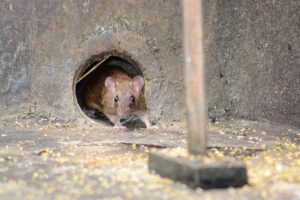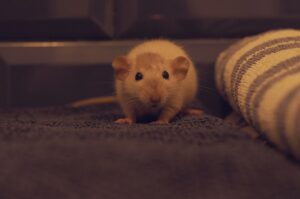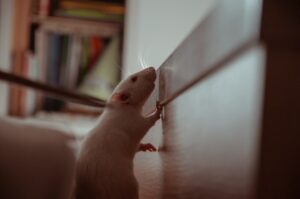Table of Contents
Mice are top-level pests, and they can do more than just destroy your home; they can even make you sick if you’ve heard odd sounds and noticing bits of torn paper and materials around your house you likely have an infestation. Mice don’t just leave a trail of destruction; the fluids and droppings they expel also cause harm. Can mouse droppings make you sick? Definitely. Historical accounts have pointed to widespread plagues caused by rodents, and modern medical experts have identified diseases that can be specifically traced to rodents. If you have a rodent infestation in your home, it is crucial to note that it is a serious issue that can undermine your health to the point that you may have to SOS for professional pest control services in case things get out of hand
Can mouse droppings make you sick? —top 4 diseases from mouse
Hantavirus Pulmonary Syndrome
Hantavirus Pulmonary Syndrome, otherwise known as HPS, is a serious and deadly disease that attacks the respiratory system in humans.
Can mouse droppings make you sick? If you have come in contact with rodents, you are in danger of getting this disease. The main culprit for HPS remains to be the population of rodents in the house. Even if you are enjoying good health, exposure to the HPS virus can cause immediate deterioration in your health.
Up to this day, there are no cases of HPS virus transmission from person to person in the US. Transmissions are exclusively between rodents and humans. Can mouse droppings make you sick? Even among health care workers who have gotten exposed to patients with HPS, there have been no cases of transmissions. Likewise, medical practitioners who handle HPS specimens are not infected.
However, in the regions of Chile and Argentina, there are cases of people getting a person-to-person infection of the HPS virus. These occur during close contact with infected patients. This particular expression of the HPS virus has been called the Andes virus.
Transmission
Mice can spread HPS in the US. The mode of transmission is the urine, droppings, as well as saliva. The virus is transmitted to people who breathe in the fumes, which has the virus.
When mice urine is fresh or if the mice’s nesting is disturbed, tiny air molecules with the virus spread into the air. Airborne transmission occurs at this point.
Other than this, rodents can also spread the HPS virus in other ways. Can mouse droppings make you sick? If mice or rodent bites a human, the HPS can be spread, but this mode of transmission is quite rare. Medical experts have theorized that people get sick of the virus when they touch materials that have mice urine or droppings, and saliva and then bring their hands to their faces near their nose or mouth.
It is also possible that consuming foods with traces of urine, droppings, and saliva from an HPS carrying rodent can also cause the disease.
HPS in the US cannot be contracted from person to person. You can be relatively virus-free even if you kiss or touch a person with HPS. You cannot also get the from health workers who are exposed to HPS infected patients.
In the regions of Chile and Argentina Andes virus is the term coined for a person to person transmission of HPS. Unlike in the US, this virus can be spread from an infected person to a person without the virus.
Salmonella
Salmonella manifests as diarrhea in humans. They are infinitesimal microorganisms that get transmitted from the feces of infected people to animals such as rodents to other people and animals. A person or animal can be a carrier of Salmonella and exhibit no symptoms. Rodents and animals, such as reptiles, can infect humans with Salmonella.
Tips for Preventing Salmonella from Rodents
It is crucial to clean hands with soap and water after touching rodents or their nests. Handwashing is your first defense against Salmonella infection. Clean and sterilize rodent nests or habitats in your home whenever possible. If you keep mice or rodents as pets, you should clean their housing in the laundry area or your bathtub. Never clean the rodent or mice items in your kitchen sink or in areas where you prepare food. You should also avoid using the bathroom sink to clean your pet’s items.
Can mouse droppings make you sick? Rodents or mice as pets are not advisable in families with children who are under five years old. This kind of pet should also be avoided by pregnant women as well as people with compromised immune systems because they are more vulnerable to getting diseases.
As a precaution, do not consume food or smoke when touching your rodent pet. Avoid handling your pets near areas where food is prepared. Keep your pet away from your mouth. Do not kiss them or hold them close to your lips.
Leptospirosis
Leptospirosis is a disease-causing bacterium that can infect both humans and animals. When humans are infected by leptospirosis, they tend to suffer symptoms that can be mistaken to be other diseases. In some cases, a person may carry the bacteria but exhibit no symptoms.
If left untreated, leptospirosis can worsen and destroy kidneys, causing meningitis, which inflames the membrane around the brain and the spinal cord. There is also bound to be liver failure, respiratory ailments. The worst outcome of leptospirosis is death.
Infection
The bacteria which carry leptospirosis are hardy and can be transmitted through the urine of infected animals. The infection can get into water and soil and can live there for weeks and months. A variety of animals can serve as hosts for the bacteria. Among the animals that may carry leptospirosis include farm animals such as cattle, pigs, and horses. Can mouse droppings make you sick? Of course, rodents that populate your house may also carry the leptospirosis bacteria. Although these animals are infected, they may exhibit no symptoms.
As a result, these animals will continue to spread the bacteria via their excretions. This can occur occasionally or up to the long term and may even last for years.
Humans can get leptospirosis disease by touching the urine of infected animals. Coming in contact with a material that has been soiled by the urine of infected animals can also cause infection.
The leptospirosis bacteria can pass through the skin and membranes of the eyes, nose, and mouth. Skin that is broken or has cuts and scratches are more vulnerable. Ingesting water that has been contaminated can also cause the illness. Leptospirosis outbreaks usually happen when exposed to infected waters during flood season. Transmission between persons is quite rare.
Rat-bite fever or RBF
Two types of bacteria cause rat-bite fever. The first one is Streptobacillus moniliformis, which is found in North America. The other is the Asian variety called Spirillum minus, which is also called sodoku.
Infection happens when people come in contact with rodents who have the bacteria. Humans can also get the illness by consuming food and water with traces of urine and droppings of bacteria carrying rodents.
RBF should be treated promptly otherwise, it can become fatal.
Transmission
If you get bites and scratches from rodents, you may likely get RBF. The bacteria can directly pass through the body via the open wound and membranes in the eyes, nose, and mouth.
RBF can also be transmitted when you touch or handle rodents and come in contact with their urine saliva or droppings.
If you come in contact with surface areas that have this bacteria infection can also happen. RBF can pas through open cuts, wounds as well as membranes in the eyes, nose, and mouth. Ingesting food with urine or droppings from infected rodents can also cause RBF.
Person to person transmission doesn’t happen with this disease. RBF can be fatal, so it is vital to get medical help at once if you suspect that you have symptoms of this disease.
Can mouse droppings make you sick? –what you need to know about mice in your home
They can make you very sick
House mice can spread diseases through their urine, droppings, and nesting materials. The diseases they cause can be fatal, and if there is a severe infestation in your home, the hazard of getting a rat borne disease multiplies.
They multiply fast
You may think your home is mouse-free, but unbeknownst to you, they may just be hiding in the corners and shadows. If you think you only have a few, you may get the surprise of your life that there are dozens. Mice breed all year, and a single female can breed ten litters in a year. A single-family can multiply in three months.
They can destroy your home
It may be a dramatic warning, but mice can cause your house to catch fire. Mice enjoy nothing more than chewing cables and wires. If you sense them behind your walls or scurrying in your attic, there is a big chance that they are gnawing their way through your electrical system, which they have full access to. They love the strong cables and wiring most, especially because they need to keep their teeth sharp and short. They may also nibble at your wire to get pass areas it is blocking. Once the plastic covering of the wire gets nibbled away, sparks can occur, increasing the chances for fire. According to data, unknown cases of fire may be traced to rodent infestations.
It should be noted that rodents can chew through anything tough and hard from wood, concrete, and even metals.
They will eat anything
Rodents will eat anything and though anything. They love grains and cereals most of all and can go through a box speedily and effortlessly. Mice are also rabid eaters and frequently eat of up to twenty times per day. They will also make a food source their nest so you will likely find them in your kitchen or pantry. There is a high chance of mice contaminating your food, and if you ingest these foods, you will get diseased.
Cleaning up after mice
Can mouse droppings make you sick? There is a high risk associated with mice, and cleaning and disinfecting areas they have touched should be done with caution. These spots will likely have urine and droppings, which can be infectious and carry disease bacteria.
Using a vacuum or broom to clean droppings of mice is a big no-no. Fumes and bacteria will be released into the air, and the ensuing dust particle scan make you sick. It is crucial to wear a mask at all times and wear gloves of vinyl material while cleaning mouse habitats.
The CDC recommends that commercial disinfectants be applied to the infected areas. You can create a strong disinfectant by mixing parts bleach and water and letting it steep for five minutes. Afterward, use some disposable towels to clean the area. Once finished, discard the disposables into a bag and place them with the garbage outside. The area should be thoroughly cleaned and disinfected.
Protect Yourself from Mouse Droppings
Getting somewhat ill from mouse droppings is a high possibility. If you are unlucky, you may get a fatal illness form mouse. It is better to be protected and safe than to have regrets later on from being lax with your protection. If you are cleaning infected mouse areas on your own, you need to get protective gear such as a respirator, eye protection shields such as goggles, hand gloves, a smock gown, and some shoe coverings. Respirators are especially vital. When you clean the rodents’ droppings, there is a chance that these will crumble, creating dust particles to be released into the air. This dust will have a microscopic pathogen that contains diseases. If you inhale them, you can get ill.
If you think that your mouse infestation cannot be resolved with your DIY efforts, the best path you can take is to get professional cleaners from a pest control company with the experience and equipment to remedy your pest problems.
Final Thoughts
Having mice infestation in your house can be a real nightmare. Their presence can cause you to be wide awake at nights with their scurrying feet and the countless damages you imagine they are doing to your property. Hunting them down and disinfecting their nests requires skill and the proper equipment. If your infestation is too overwhelming, the best thing you can do is to get professional pest remediation services. Can mouse droppings make you sick? Do not DIY your house problems and get the help of experts instead because exposure to mice, urine, and feces can cause illness.





